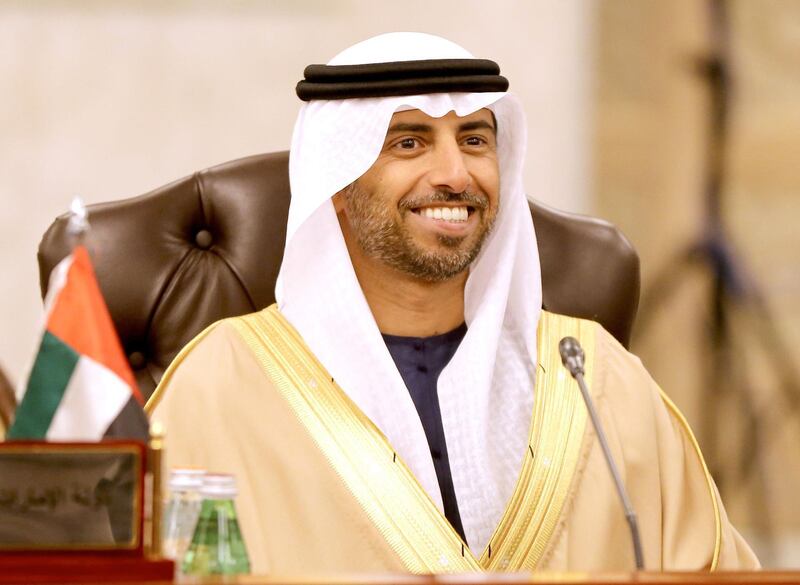Oil markets are set for continued upward correction in 2018, with market fundamentals rather than geopolitics playing a stronger role in boosting prices, the UAE's Minister of Energy Suhail Al Mazrouei said at a forum on Thursday.
"I think we are continuing to see market correction, and as we move into 2018 we will see more correction happening," Mr Al Mazrouei said on the sidelines of the UAE Energy Forum in Abu Dhabi.
"Don't forget that we're in the winter, the season typically where demand is higher. We always look at the full year and we have at least a 100 million [barrels of excess supply in the market] to remove."
The UAE, along with its fellow Opec members and producers outside the group led by Russia, agreed to extend production curbs of around 1.8 million barrels per day (bpd) in November to reduce oil inventories that have weighed down the price of the commodity since 2015.
The price of Brent crude futures briefly hit a fresh two-year high of US$69.58 on Thursday, coming close to the $70 level identified by analysts as conducive for US shale producers to return to the market in force.
_______________
Read more:
[ Oil deadlock set to persist for some time ]
[ Oil prices at their highest since 2014 amid warnings of overheated market ]
[ Adnoc awards Feed contracts for offshore sour gas recovery projects ]
________________
Goldman Sachs said recently that Opec would try to talk down prices from climbing up to up $70 bpd, a range that would prompt the return of US shale into the market.
Mr Mazrouei, who assumed the presidency of Opec this year, dismissed the group's concerns over the surging price.
"I'm not worried about where the price is today and what's most important for us is the balance and we still haven't got there yet," he said.
US shale production surged 16 per cent to 9.8 million bpd towards the end of last year, according to the Energy Information Agency, thanks to increased production efficiencies achieved by independent producers. The country's total oil production is forecast to rise to 10 million bpd as soon as next month, exceeding current Saudi production levels, and rising to 11 million bpd - higher than Russia's current output - in late 2019, according to US government forecasts.
Mr Al Mazrouei, however, remained positive about the influx of shale into the markets, noting that "shale oil could come to rescue at a certain time", he said.
"The only issue with shale oil is the pace of production. We need to adhere to something within the supply and demand factor," he said during a panel session at Thursday's event.
Opec and non-Opec producers agreed to curb output in late 2016 in a bid to prop up prices, which had fallen below $28 per barrel earlier that year. Oil prices stabilised in 2017, picking up in the latter half of the year. Prices were bolstered by the turbulent aftermath of the Kurdish independence referendum in September, together with supply disruptions stemming from the closure of a key North Sea pipeline for emergency maintenance.
The markets in 2018, however, will be "less speculative" noted Mr Al Mazrouei.
"We're moving to an environment where there's less speculation, less geopolitics, more of market fundamentals," he said.
"It's getting to shape as we correct the market to become market fundamentals-oriented expectations rather than speculations."







